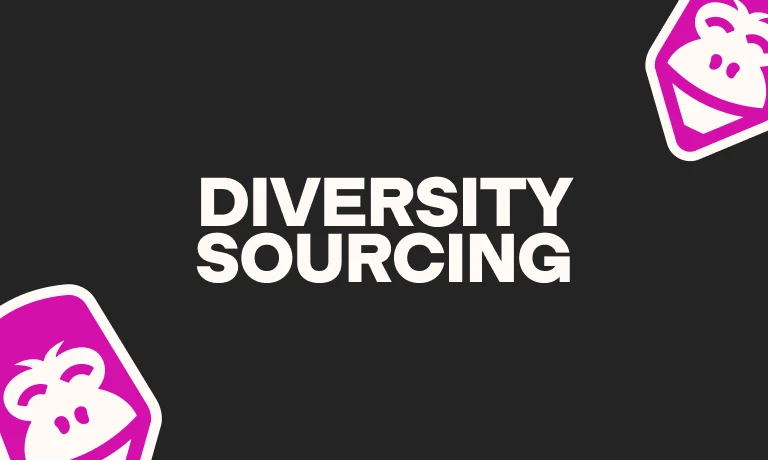How to hire a successful marketing team: Roles, structure, and a step-by-step process
The right marketing team can catapult your brand into the spotlight, while a mis-hire can leave you struggling to build and execute a robust marketing strategy.
To assemble a strong marketing team, you need the right people with the right skills. You need to look for marketers who are creative and analytical and who aren’t afraid to roll up their sleeves and do the work.
But where do you start? How do you ensure that your team is diverse in skills but unified in vision?
Whether you're a startup looking to establish your marketing footprint or an established company aiming to rebuild your brand from the ground up, this guide will walk you through the essential steps to building a skilled and creative marketing team.
In this article, you’ll find out:
What a marketing team does
What key marketing roles you should look to fill
What skills to look for and how to assess them
How to build a marketing team, step by step
What do marketing teams do?
Marketing teams are responsible for defining and executing the overall marketing strategy and vision of a company.
The end goal? Driving sales and growth.
To achieve this, marketing teams need to:
Research and analyze market trends, consumer behaviors, and competitors
Define a target audience and a buyer’s persona
Work with other teams (such as the product development team) to define the product or service’s positioning and messaging
Develop and manage a brand's identity, ensuring consistency in messaging and visual elements across all channels (omnichannel marketing is now more important than ever, according to McKinsey & Company)
Build and execute a marketing strategy to promote a brand and increase brand awareness
Create engaging content, such as blog articles, social media posts, graphics, videos, podcasts, and more
Use different strategies to grow a brand’s online presence, including search engine optimization (SEO), search engine marketing (SEM), pay-per-click (PPC) ads, email marketing, and more
Manage and grow a company’s reach on social media by publishing new content, engaging with communities, and monitoring performance
Plan and execute advertising campaigns across different channels by defining the right target audience and assessing results
Support sales teams with different tools, strategies, and marketing materials to facilitate the sales process
Analyze and report key performance metrics to gauge the effectiveness of marketing efforts
All those tasks are interrelated; depending on the size of the team, one person might be responsible for many of them at once, or a few people might be working within a single function.
What are the most essential roles in a marketing team?
In smaller organizations, each member of the marketing team might wear many hats and take on many different responsibilities from the ones listed above.
Big companies typically have larger marketing teams, where everyone has a highly specialized role and is focused on a few key tasks.
For example, larger marketing departments might have a content team, a social media team, and a communications team, while smaller teams might have the same person be responsible for all three functions.
Some of the most important roles in a marketing team are:
Marketing director
The marketing director – who might also have the title of chief marketing officer (CMO) or head of marketing – is responsible for:
Overseeing the marketing department
Defining marketing goals and strategies
Ensuring that all marketing activities align with the company's growth and sales objectives
They report to the company’s leadership team (C-suite or other managers) and define long-term marketing strategies.
Brand manager
Brand managers focus on developing and maintaining a strong brand image. For this, they need to:
Define a strong brand image
Build a brand strategy
Create brand guidelines
Manage the overall perception of the brand in the market
Content manager or content lead
Content managers (also known as content leads) are responsible for building and executing the company’s content strategy, usually with the help of content writers, editors, designers, and video producers.
Here are some of the key responsibilities of content managers:
Oversee the production of content for the company’s website, social media, and other channels
Manage content budgets
Manage a team of content creators and editors and provide editorial support, direction, and feedback to them
Analyze content performance and optimize content for maximum engagement and reach
Ensure consistent brand messaging across all channels they’re responsible for
Manage content calendars and workflows
Ensure content is optimized for search engines
Content creators
Content creators specialize in creating content for various platforms to build, engage, and educate the brand’s audience.
For this, they might produce different types of content, such as:
Blog articles
Social media posts
Videos
Podcast episodes
Graphics and images
Usually, content creators specialize in one type of content, so you might consider:
Hiring a few content creators
Focusing on one main type of content and repurposing it for other channels
Working with independent contractors (freelancers)
Copywriter
Copywriters create persuasive copy for various channels, including a company’s website, social media, ads, newsletter, and more.
To be successful in their roles, copywriters need to:
Collaborate with marketing, design, and product teams to define messaging
Produce copy for different marketing assets
Edit and proofread copy
Adapt their writing style to various audiences and purposes
Perform research and ensure their copy is accurate and free of errors
Make sure their copy is aligned with the best practices of SEO (when writing for websites)
SEO specialist
SEO specialists focus on improving the company's presence in search engine results. For this, they:
Do keyword research and analysis
Create an overall SEO strategy for new and existing content
Optimize existing website content and performance
Help guide content creation efforts in collaboration with the content lead
Social media manager
Any company today needs a strong social media presence. Social media managers are the ones to help build and maintain it, across the channels that are the most relevant for the specific business.
For this, they work with other marketers from the team (copywriters, content creators) to create engaging content. They’re also responsible for communicating with users on social media channels and analyzing social media performance.
Designer
Designers help build the company’s visual identity. For this, they develop the overall layout and design for all kinds of marketing assets, such as the company’s website, its ads, all sales and marketing materials, and more.
There are many types of designers:
Graphic designers
UX/UI designers
Web designers
Information designers
Interaction designers, and more.
Some companies might have entire design teams, while others might work with freelancers or one or two in-house designers.
The best insights on HR and recruitment, delivered to your inbox.
Biweekly updates. No spam. Unsubscribe any time.
Skills to look for when building a marketing team
To build a successful marketing function, you need to have several key marketing skills in your team. Here are the most important ones:
Market analysis
To create a sound marketing strategy, your marketing team needs to do in-depth market research and analysis.
This involves:
Gathering information about your market, competitors, and potential customers
Analyzing and interpreting consumer demographics and behavior
Performing SWOT (strengths, weaknesses, opportunities, threats) analysis
Analyzing different pricing models
Assessing market risks
Look for marketers who know how to analyze your market in-depth and who, ideally, have industry-specific experience and insights.
Marketing analytics
As McKinsey & Company points out, decisions in marketing need to be informed by real-time data, of which there is plenty nowadays.
Every marketing tool that you use collects enormous amounts of information that you could use to better define your audience, track performance, assess the success of different marketing initiatives, and more.
Strong marketing analytics skills are therefore essential for any marketing team today.
SEO/SEM
Most brands today rely on search engines to reach their customers – which means that your marketing team needs to have the right search engine optimization and search engine marketing skills to succeed.
This would enable you to increase your online visibility in organic search results and via paid ads and make your brand a top-of-mind solution for customers.
Content creation
Content is the primary medium through which a brand tells its story, communicates its values, and establishes its identity. Therefore, expert content creation skills are essential for the success of any marketing department – and the company as a whole.
Hire marketers who are capable of producing content that:
Is original, engaging, and authentic
Provides a lot of value to your audience (in the form of insights, frameworks, new information, and more)
Is in line with the best practices of content marketing
Creativity
The most successful marketers are those who dare to try new things, build innovative strategies, and use new approaches to common problems.
Creativity is essential for that – and is the most important skill in today’s job market, according to the World Economic Forum (WEF)’s report on the future of jobs. According to the same report, demand for creativity will grow faster than that for any other skill, by 73% in the next five years.
Make sure you hire a team of creative professionals who understand the importance of innovation when looking to attract and engage audiences and create a memorable brand.
Teamwork and communication
Marketing is a team effort where many people bring various skills and perspectives to the table and work together to create a common vision.
For this, everyone needs to be an excellent team player and communicator – regardless of their communication type. This helps create a positive work environment where everyone feels heard and valued – and enables your team to create well-rounded and effective marketing strategies.
Problem solving
A big part of a marketer’s work is identifying challenges – such as changing market trends, limited budgets, fierce competition, and more – and coming up with practical ways to address them.
Strong problem-solving skills would enable your team to analyze problems and formulate solutions that give your company a competitive advantage and improve the efficiency of your marketing campaigns.
Adaptability
Marketing is a constantly evolving field, influenced by economic trends, cultural shifts, and technological advancements, such as AI, algorithm updates, or new tools becoming available.
For example, Google updates its algorithms thousands of times per year, with at least a few annual core updates. This has a profound impact on SEO and SEM best practices and on digital marketing as a whole.
Therefore, it’s essential to hire a marketing team that not only stays up to date with major shifts but is also capable of adapting to them quickly. This enables your company to stay relevant and competitive – and gives it the best chances of success.
How to build a successful marketing team: A step-by-step guide
Now that you know what skills to look for when building your marketing department and what roles to hire for, let’s see how your marketing team hiring process looks like in practice. Below, you’ll find our step-by-step guide to recruiting talented marketers for your team.
Step 1: Define the structure of your future marketing team
The size and the hierarchy of your marketing team will depend on your specific goals and company culture.
Here are three options to consider when choosing the structure of your marketing team:
Functional structure: This is a conventional structure where each team member is responsible for a specific type of work, such as SEO, social media, content creation, and more. Smaller businesses might adopt a more generalist approach at first, with team members handling a broader range of marketing activities.
Product-oriented structure: In this structure, each team or team member is responsible for all aspects of marketing for a particular product, from content creation to paid ads and reporting. This structure is very flexible but requires hiring highly adaptable marketers with broad expertise and industry-specific knowledge.
Hybrid structure: In a hybrid structure, each team member is responsible for a specific aspect of the marketing of a given product or service; you might decide to build cross-functional teams based on specific needs. This structure is more flexible but requires a large marketing function, so it’s best suited for more established organizations.
Step 2: Identify the roles for which you need to hire
If you’re just starting out, not all marketing roles would require hiring a full-time employee from the start. For example, you might wish to hire a marketing manager who works with a team of independent contractors or a content lead who works with a content agency or freelance content creators.
Some of the first roles you might wish to consider hiring for are:
Content writer or copywriter
Graphic designer
Social media manager
Product marketing specialist
Step 3: Define key marketing skills for each role
Next, you need to define the most essential skills for each role, based on your requirements. It’s important to differentiate between must-have and nice-to-have skills.
Here are a few examples – but obviously, the table will look different for each specific business:
Role | Essential skills | Nice-to-have skills |
Marketing manager | - Market analysis - Strategic planning - Leadership and people management - Communication | - Search engine optimization (SEO) |
Content writer | - Excellent writing and research skills - Time management - Communication | - Experience with content management systems (CMS) - Basic graphic design skills |
Graphic designer | - Proficiency in design software (Adobe Illustrator, Adobe Photoshop) - Excellent design skills - Web design experience - Time management | - Video editing - Photography |
Social media manager | - Social media management and social media community management - Basic graphic design skills - Customer service - Analytical thinking - Time management | - Basic video editing skills - Copywriting |
Step 4: Source marketing candidates
You can source candidates for your marketing team through a variety of channels, such as:
LinkedIn: You can use LinkedIn’s search filters to find local or remote candidates with specific skills and experience.
Glassdoor: Glassdoor is a platform where employees can write reviews of organizations, which helps you attract candidates who align with your company values.
MarketerHire: MarketerHire is a digital platform that puts in touch companies with experienced and pre-vetted freelance marketers.
Role-specific platforms: To hire graphic designers, you can use platforms like Behance and Dribbble; for content marketing roles, you can use ProBlogger or the Content Marketing Institute’s job board.
Employee referrals: Set up an employee referral program to leverage the personal networks of your existing team members.
Step 5: Evaluate marketing skills
To build a successful team, you need a strong talent assessment process – and, ideally, a skills evaluation platform like TestGorilla to streamline it.
With TestGorilla, you can build role-specific skills assessments featuring up to five skills tests from our test library. You can also build your customized tests or add qualifying questions. Here are some examples of skills tests you can use:
Marketing analytics: Evaluate candidates’ marketing analytics skills to build a data-driven marketing function.
Product marketing management: Hire applicants who have a deep understanding of key product marketing principles, users’ needs, and stakeholder collaboration.
Growth marketing for B2C or e-commerce: Unlock new opportunities with the help of the marketing experts who specialize in growth marketing for B2C and e-commerce businesses.
Leadership and people management: If you’re hiring for leadership roles such as a marketing manager or chief marketing officer, you can use this test to identify applicants with excellent people management skills.
Problem solving: Marketing is all about solving common problems in new or unusual ways. Check whether your applicants have the right problem solving skills with this test.
Communication: Any member of your marketing team will need to communicate on the daily with colleagues, stakeholders, partners, and even customers. Make sure the people you hire have the skills to express themselves clearly and listen attentively to others.
Step 6: Use the right marketing interview questions
Once you assess applicants’ abilities with the help of skills tests, it’s time to invite your best talent to an interview. Here are some interview questions you could use:
How do you measure the success of a marketing campaign?
Can you discuss a marketing project where you had to collaborate with a cross-functional team?
What's your approach to understanding and targeting an audience?
How do you use data analytics in your marketing decisions?
How do you approach creating a campaign for a completely new market or audience?
What's your experience with developing marketing plans for product launches?
What's your approach to A/B testing in digital marketing?
Discuss your experience with customer relationship management (CRM) systems.
If you need more ideas, check out our:
Step 7: Hire and onboard new employees
The last step of the marketing team recruitment process is to decide whom to hire and onboard new team members. Use an onboarding checklist to streamline your onboarding process and make sure you involve employees from other teams and departments.
Hire a talented marketing team with the help of skills tests
Hiring an entire marketing team is not an easy task – but if you have the right tools, you can make it significantly simpler.
Using a skills testing platform like TestGorilla enables you to evaluate candidates’ strengths and weaknesses fairly and objectively and make data-driven hiring decisions when building your marketing team.
Try out TestGorilla with our free plan to see for yourself how easy it is to build a skills assessment – or sign up for a free 30-minute live demo to chat with one of our experts and make sure you have everything you need to get started.
You've scrolled this far
Why not try TestGorilla for free, and see what happens when you put skills first.



















